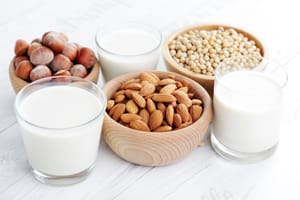Evaluating the Hot Market for Plant-Based Beverages
[This article was previously published in the winter issue of The Cultivator, Cornucopia’s quarterly newsletter.]
by Anne Ross, JD
Farm and Food Policy Analyst at The Cornucopia Institute
 |
Sales of non-dairy, plant-based beverages are burgeoning. In 2010, only one-fifth of U.S. households purchased or consumed plant-based beverages. By 2017, these beverages, commonly referred to as “milk,” had posted a 9% gain and reached a whopping $1.6 billion in annual sales.
Supermarket shelves are stocked full of plant-based beverage options, derived from a variety of sources, including nuts, seeds, legumes, and cereal grains. These products can be found in an assortment of flavors in both refrigerated and shelf-stable packaging. As plant-based beverages take over grocery store displays, it’s important for consumers to have the information they need to evaluate which, if any, of these beverages are right for them.
Cornucopia’s upcoming report and the accompanying scorecard will help consumers compare nutritional profiles of plant-based beverages, while also comparing them to that of dairy milk. Cornucopia’s report rates over 300 products from 49 brands, making it the most comprehensive examination of plant-based beverages available.
The ratings show that nutrient density of plant-based beverages varies widely and within types, depending on the amount of plant material used, the processing methodology, and the addition of other ingredients,
such as sugar and oils.
USDA certified organic plant-based beverages and those containing organic ingredients received higher marks on the scorecard than their conventional counterparts because of concerns over contamination from agrichemical residues. Products manufactured with carrageenan or other thickeners and stabilizers received lower marks, as did products containing vegetable oils.
Consumers can also use Cornucopia’s web-based scorecard to check the sugar content of each product. Astonishingly, some of these beverages advertised as “healthy” alternatives to real milk have a sugar content equal to, or greater than, many soft drinks.
The World Health Organization recommends limiting added sugar to 5% of your daily calorie intake, which amounts to about 25 grams (six teaspoons) of sugar per day. Sugar has been linked to obesity, diabetes, and heart disease. Added sugar content can vary widely among plant-based beverages, some containing over 20 grams (five teaspoons) of sugar per cup.
But large-scale, plant-based beverage manufacturers have touted the health benefits of their products, while unfairly creating skepticism about dairy consumption. A recent study found that over half of consumers purchasing plant-based beverages do so because of the perception that they are “better for you.”
Some shoppers cite environmental impact concerns and lifestyle choices as reasons for choosing plant-based alternatives, while others simply just like the taste of the products.
Lactose-intolerant consumers and those with milk allergies or sensitivities have welcomed the plant-based alternatives to the market. But a recent survey found that 90% of households purchasing plant-based beverages also consume dairy products.
Authentic organic cow’s milk is a highly nutritious food that, unlike most plant-based beverages, does not undergo processing and extensive fortification with additional ingredients. Studies have shown that milk from animals raised with organic production methods has a higher content of omega-3 fatty acids. These are essential for human health and often under-consumed in relation to omega-6 fatty acids.
Grass-fed dairy production, mandated by the organic standards, is also one of the best possible sources of a powerful fatty acid called conjugated linoleic acid (CLA), which has been linked to a range of health benefits, including reduced risk of cardiovascular disease, certain cancers, and obesity.
Many plant-based beverages are fortified to replicate the nutritional profile of cow’s milk. The FDA is prioritizing its effort to examine public health concerns associated with dairy alternatives. Among other things, they are concerned about the potential adverse health effects that substituting dairy alternatives for milk in the diets of growing children without medical supervision.
The FDA has invited stakeholder feedback as it evaluates the use of the term “milk” to describe these products. FDA Commissioner Dr. Scott Gottlieb recently said, “An almond doesn’t lactate, I will confess.”
For those who must drink plant-based beverages, organic is a better choice than conventional. The organic regulations require that the plant material be grown without most synthetic fertilizers and pesticides. Processed food that is certified organic contains only additives that have undergone rigorous review in terms of human health and environmental impacts.
As the debate continues, consumers considering plant-based beverages will have a valuable tool in our
scorecard. In addition to rating individual products, the scorecard also examines brands to help consumers decide which brand to patronize when comparing similar products.
The report highlights several organic brands that receive high ratings, including Three Trees, Malk, and Mooala. All of the plant-based beverages produced by these companies are certified organic. Whether one chooses dairy or plant-based beverages, or a diet including both, one choice is clear: organic is always the better option.

